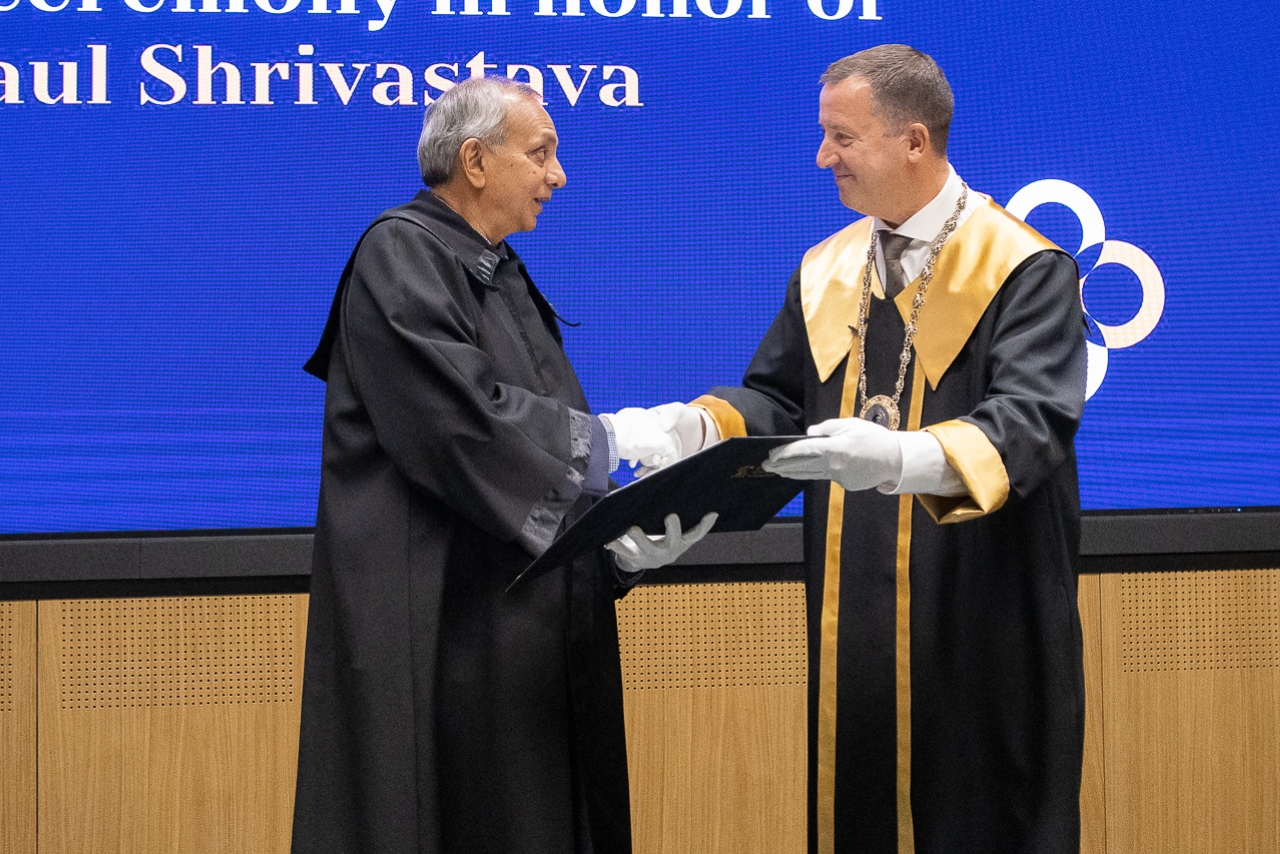World-renowned environmental scientist honored by Corvinus

The award was presented to Prof. Dr. Paul Shrivastava on the 12th of November by the Rector of Corvinus University, Bruno van Pottelsberghe.The awardee is the first Chief Sustainability Officer at Pennsylvania State University, earlier he worked for the UN’s climate change panel, the IPCC. Since 2023 he is Co-President of the Club of Rome.
The Club of Rome is a platform of prominent scientist and thought leaders who identify holistic solutions to complex global problems and promote policy initiatives and actions to enable humanity to emerge from multiple planetary emergencies. The organization has prioritized five key areas of impact: Emerging New Civilizations; Planetary Emergency; Reframing Economics; Rethinking Finance; and Youth Leadership and Intergenerational Dialogue.
Radical and systemic change in business is needed
The professor gave a lecture on the ceremony where he said: We have now entered the Anthropocene era, when humans are irreversibly transforming the Earth. Professor Paul Shrivastava used his own life story to tell the ceremony how he came to the conclusion that radical and systemic change in business is needed for the survival of the planet, and this requires a major change in business education.
The Bopal tragedy in his hometown, which claimed 10,000 lives, first drew his attention to environmental issues in terms of crisis management and risk management of industrial disasters, and then he joined the, where he witnessed the hopeless struggle of climate scientists over many decades.
We have already crossed several planetary boundaries, we are using our resources at an accelerating rate, and overconsumption has already led to the collapse of some ecosystems. Growing social inequalities are also a major problem.
There are three main areas where change is needed. Instead of the exploitative approach to extraction, we need to shift to a regenerative management. Instead of individual wealth creation, the focus must be on shared well-being, where profit maximisation is replaced by sufficiency. Efficiency must be replaced by resilience, which allows both mitigation of planetary crises and adaptation to change.
Young people see that there are other ways to exist
Despite the ominous data, he is optimistic about the future. When asked by the public, he said:
we have killed the planet, but young people see that we have to go in a different direction.
He said that the many demonstrations, activism and resistance are proof that more and more people are realising that “there are other ways to exist”.
The most important thing is that young people have the courage to speak out, even in universities, and that the students will be supported by academics if they see the determination. Universities have a business interest in putting students first, and if students demand change, universities must adapt.
Business education must be transformed from the ground up. Old, outdated theories must be relegated to the history books, and instead education must be built around the concept of the whole person. The goal should not be to educate robots, but to educate autonomous and self-reliant citizens who are capable of knowing themselves, their own physical, psychological and mental well-being, and who take care their healthy environment, and who can even work with their teachers to invent the future they will live in.
In transforming a profit-driven, exploitative world, we also need to move beyond GDP-centered thinking, which has been completely misinterpreted in recent decades and does not reflect true human well-being at all. We need to move beyond the imperative of continuous production, and everyone has an equal role to play in this, be it corporations, government regulators, or the actions of citizens. The latter is the most achievable for us, as it is easier to change our own lives first, but it is not in itself a sufficient condition.
The impact of individuals alone remains atomized, which is why the whole system needs to change.
The professor admits that there are subsystems that no longer stand a chance to survive, but there is still much that can be fixed. Often the dire predictions are not matched by their limitations, and we often forget that social systems can change radically relatively quickly, in as little as 10-15 years. But to make that change, we need all hands on deck.
More than a decade of collaboration
Paul Shrivastava is the author of 20 books and nearly 150 papers. His work has been cited over 23,800 times. He holds a Ph.D. in strategic planning and philosophy of science from the University of Pittsburgh. His name is associated with many scientific and institutional innovations. He was one of the founders of Hindustan Computers Ltd (one of the largest computer companies in India).
Paul Shrivastava’s collaboration with Corvinus University of Budapest began in 2012. He was the keynote speaker at the international conference “Spirituality and Sustainability: New Path for Entrepreneurship” organized by the university and also gave a lecture at the CEMS program of the university. He maintains good academic relations with researchers from different Corvinus institutes and has a continuous collaboration with the research staff of the Corvinus Institute for Advanced Studies and the Business Ethics Center, and on 11 November he and Prof. Dr. László Zsolnai organised a joint conference for university citizens on “Business Education and the Future of the Planet“.





